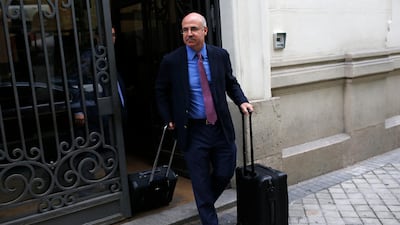A prominent critic of the Kremlin says Russia is abusing an Interpol system of warrants that caused him to be briefly detained in Spain on Wednesday.
William Browder, a US-born investor based in London, said he was in the Spanish capital to share evidence with prosecutors on money laundered in the southern European country by Russian criminal gangs.
In December, a Moscow court sentenced Mr Browder to nine years in prison in absentia over tax evasion and funnelling money overseas. The financier and Ivan Cherkasov, an associate who was sentenced to eight years behind bars, were also ordered to pay 4 billion roubles (Dh236.3 million) to the Russian government in damages.
The same court convicted Mr Browder of tax evasion in another trial in absentia in 2013.
Mr Browder has dismissed the accusations.
He has advocated for US sanctions targeting Russian officials over human rights abuses. He was the driving force behind the Magnitsky Act, named after Mr Browder's former employee Sergei Magnitsky, who died in jail after accusing Russian officials of involvement in a tax fraud scheme.
The Magnitsky Act became a sore point between the United States and Russia after it was signed into law by former President Barack Obama in 2012. Shortly afterward, President Vladimir Putin signed a law banning American citizens from adopting Russian children, in a move widely viewed as retaliation.
_______________
Read more:
Russian opposition leader arrested at anti-Putin protest
Russian journalist shot and killed in Kiev
MH17: Russian military missile downed passenger jet, probe says
_______________
Spain's national police said Mr Browder had been detained briefly on Wednesday morning and taken to a central police station until agents confirmed that an arrest warrant from Russia that police said appeared in Interpol's system was outdated.
Mr Browder posted a photo of himself outside a police station saying he had been released "after Interpol General Secretary in Lyon advised them not to honour the new Russian Interpol Red Notice".
He wrote that: "This is the sixth time that Russia has abused Interpol in my case."
However, in an email, Interpol said it has never issued a Red Notice for Mr Browder. Red Notice alerts are sent to Interpol member countries to locate and arrest specific people based on a national warrant.
As early as July 2013, the international police organisation said it erased from its database Russian requests to locate and arrest Mr Browder due to its "predominantly political character."
Fair Trials, a global criminal justice watchdog, said the confusion over Mr Browder's arrest highlighted the serious problems with Interpol's system of global "wanted person" alerts.
"Interpol should scrutinise alerts before it puts them out through its international networks," Fair Trials ehief executive Jago Russell said in an email on Wednesday. "Spain should also exercise sense and discretion before arresting people. The result could have been very different if it weren't for Browder's high profile."
In an image of a detention report posted by Mr Browder himself on Twitter, police identified the reason for the detention as "fraud".
British Foreign Secretary Boris Johnson welcomed Mr Browder's release, tweeting: "Just spoken to Bill Browder – very glad that he has now been released".
"Moscow should concentrate on bringing those responsible for the murder of #Magnitsky to justice," Mr Johnson added.
Mr Browder led one of the biggest investment funds in Russia for 10 years before he left the country and was barred entry in 2006 as a threat to national security.

